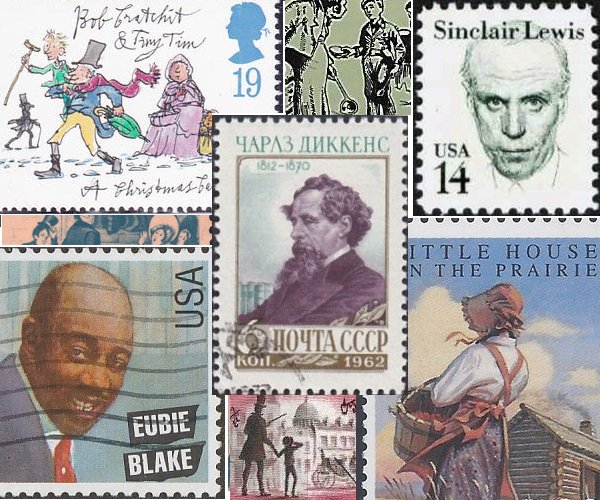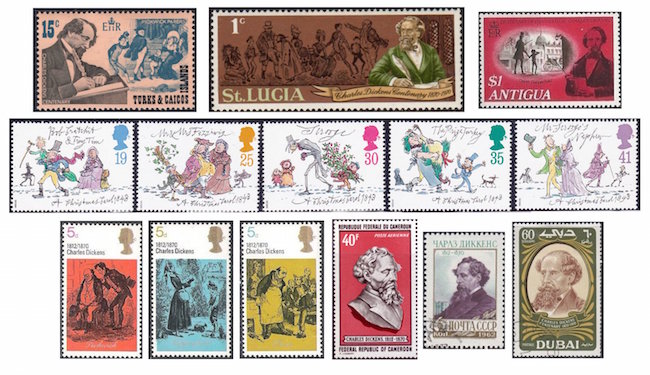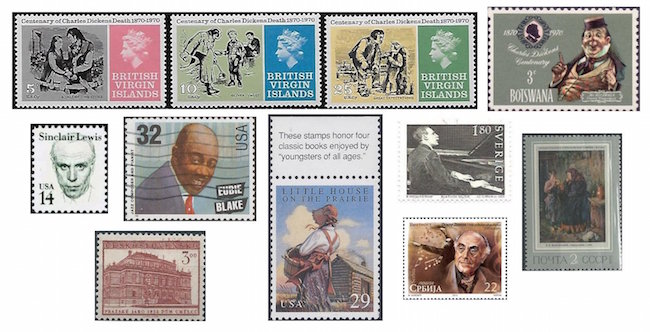The Arts on the Stamps of the World — February 7
An Arts Fuse regular feature: the arts on stamps of the world.

A big day for novelists today, what with the birthdays of Charles Dickens, Sinclair Lewis, and Laura Ingalls Wilder; but we also celebrate Eubie Blake, Swedish composer Wilhelm Stenhammar, Russian painter Vladimir Makovsky, and Yugoslav conductor Oskar Danon. Also, it was on this date (maybe) that the Rudolfinium (aka the House of Artists in Prague) first opened its doors.
Did you know (I didn’t!) that Charles Dickens (7 February 1812 – 9 June 1870) wrote an opera libretto in his youth? Dickens’ sister Fanny, who had studied at the Royal Academy of Music, knew an aspiring composer named John Pyke Hullah. Dickens and Hullah collaborated on a stage work called The Village Coquettes, which received 27 performances before closing in 1837. Not much of the music has survived. A great many Dickens stamps exist, most of them from nations and territories of the British Commonwealth, and a majority show the colorful characters of the favorite novels or, as with the complete British set from 1993 in the second row, “A Christmas Carol”. Below that, three novels, Pickwick Papers, David Copperfield, and Oliver Twist, are named on an earlier set (1970) from the UK, then the author himself is seen on stamps from Cameroun, the Soviet Union, and Dubai. An attractive set from the Virgin Islands citing A Tale of Two Cities, Oliver Twist again, and Great Expections, is set alongside a portrait of Mr. Micawber from Botswana!
Poor Sinclair Lewis (1885 – January 10, 1951) gets short shrift by comparison, just a single definitive stamp from the “distinguished Americans” series issued between 1980 and 1999. (The Lewis stamp was issued in 1985.) A solitary and ungainly youth, 13-year-old Lewis, hoping to take part in the Spanish-American War as a drummer boy, ran away from home, but didn’t get far. He studied at Oberlin and Yale, where his first writings appeared in the university magazines. His early literary career did not bode particluarly well, as he turned out only pulp fiction and potboilers, but his first serious novel, something called Our Mr. Wrenn, came out in 1914, the year of his first marriage. Success came with the first of his four finest books, Main Street, in 1920. This was followed by Arrowsmith (1925), which was awarded the Pulitzer Prize (declined), Elmer Gantry (1927), and Dodsworth (1929). In 1930, Lewis became the first writer from the United States to receive the Nobel Prize in Literature (accepted). After that, Lewis wrote a further eleven novels, of which perhaps the most noteworthy (especially today!) was It Can’t Happen Here (1935), in which a fascist demagogue is elected president. By the way, a famous quotation attributed to Sinclair Lewis, “When fascism comes to America, it will come wrapped in the flag and waving a cross,” has never been definitively assigned to him, though it was most certainly characteristic of Lewis, a lifelong atheist after an early flirtation with strong religiosity. In later years, Lewis suffered the loss of his son Wells Lewis in World War II and declined into steady alcoholism, the effects of which contributed to his death at age 65.

James Hubert “Eubie” Blake was born to former slaves on this day in 1887 (though 1883 was often erroneously cited, even by Blake himself). His parents had eight children, but only Eubie survived infancy. As legend has it, little Eubie wandered into a music store and impressed the manager with his untutored playing of a pump organ. The Blakes promptly bought him a similar instrument, and he took lessons from a neighbor, becoming good enough by age fifteen to get a job playing in a cathouse (shades of Brahms). He went into vaudeville and, with his partner Noble Sissle, put on a musical revue called “Shuffle Along”, which became, in the words of Blake’s Wikipedia article, “the first hit musical on Broadway written by and about African-Americans.” One of the songs in the revue was “I’m Just Wild About Harry”. Blake served with the USO during World War II and was awarded the Presidential Medal of Freedom by Ronald Reagan in 1981. This was the year that the Broadway hit Eubie!, which had run for over 400 performances, was made into a movie. Eubie Blake died, universally admired, on February 12, 1983, aged 96.
Like Dickens, Laura Ingalls Wilder (1867 – February 10, 1957) achieved popularity with novels dealing with the lives of children. She was born in Wisconsin and moved about with her family a great deal, Missouri to Kansas and back to Wisconsin, the setting of the first two Little House books. The next book, On the Banks of Plum Creek (1937), follows her family’s move to an area near Walnut Grove, Minnesota. After that, it was Iowa, then back to Walnut Grove, then her parents and sister Mary settled in South Dakota, while Laura married Almanzo Wilder (1857–1949) and moved with him back to Missouri. There she contributed to and became editor of the local newspaper and remained for the rest of her life. Almanzo died at 92 in 1949, and Laura got along alone until her own death three days after her 90th birthday. A relative of the Delano family and thus of Franklin Delano Roosevelt, Wilder was the mother of another successful writer, Rose Wilder Lane (1886–1968). The enormously popular television series ran from 1974 to 1982, followed by various spinoffs and sequels. Laura Ingalls Wilder has no stamp of her own, but is remembered on one bearing the title of her second novel.
Stockholm-born Carl Wilhelm Eugen Stenhammar (1871 – November 20, 1927) was at first influenced by Wagner and Bruckner, then by Nielsen and especially Sibelius. He led the Gothenburg Symphony from 1907 to 1922. His well-crafted works include two symphonies, two piano concertos, six fine string quartets, four piano sonatas, etc. The Swedish stamp was issued in 1983 in a sheet commemorating Swedish musicians (including the group ABBA).

Vladimir Makovsky ([OS 26 January] 1846 – 21 February 1920) and his three siblings (brothers Nikolay and Konstantin and sister Alexandra) all had successful careers as painters. They were the offspring of Yegor Ivanovich Makovsky, an art collector and one of the founders of the Moscow Art School. Vladimir’s career can be separated into two periods: in the earlier work he uses much humor, even bordering on contempt, in his depictions of attitudes toward provincials by the aristocracy or officialdom. Later, no doubt discouraged by the lack of progress in society, his paintings turned more somber, as in January 9, 1905, on Vasilyev Island and The Sacrifices on the Khodyn Field, both of which deal with massacres of the people by tsarist forces. The stamp uses one of the earlier pieces, The Meeting of 1883.
Yugoslav conductor and composer Oskar Danon (1913 – 18 December 2009) was a Jewish Bosnian Serb. In his youth he founded a jazz orchestra called “Bobby Jazz.” Having studied in his native Sarajevo and in Prague, he began his conducting career as a chorus director. With the coming of fascism, his parents lost their manufacturing firm and home, and Danon joined the partisans, rising to the rank of major and composing some songs for them between sabotage missions and the formation of new detachments. Many of Danon’s family members died in the Holocaust, but his parents survived, moving to Italy in 1948. He directed the Belgrade Opera from 1945 to 1963, taught at the Belgrade Music Academy, and went on be named principal conductor of the Slovenian Philharmonic and the Zagreb Radio Symphony. Fifty years after World War II, he found himself under fire again, this time from snipers at one of the 1992 anti-war protests in Sarajevo. He fled to the Croatian island of Krk and, as a lifelong socialist, yearned for the days of the Yugoslavian confederation. He eventually returned to Serbia and died in Belgrade just a little over seven years ago, aged 96. The Serbian stamp appeared in 2013 for Danon’s centenary.
Finally for today, the Rudolfinium (also known as the House of Artists, Prague) opened its doors on February 7 (according to Czech and French Wikipedia) or 8 (says English-language Wiki) in 1885, but apparently no concert was held there until 4 January 1896, when Antonín Dvořák conducted. The building has been the home of the Czech Philharmonic since 1946. The stamp came out in 1952 as one of a set marking that year’s International Music Festival.
I’m surprised to find no stamp for Henry Fuseli (1741 – 17 April 1825), Swiss painter and writer on art who lived much of his life in Britain. His most famous picture is perhaps The Nightmare of 1781.
A graduate of the University of Massachusetts with a B.A. in English, Doug Briscoe worked in Boston classical music radio, at WCRB, WGBH, and WBUR, for about 25 years, beginning in 1977. He has the curious distinction of having succeeded Robert J. Lurtsema twice, first as host of WGBH’s weekday morning classical music program in 1993, then as host of the weekend program when Robert J.’s health failed in 2000. Doug also wrote liner notes for several of the late Gunther Schuller’s GM Recordings releases as well as program notes for the Boston Classical Orchestra. For the past few years he’s been posting a Facebook “blog” of classical music on stamps of the world, which has now been expanded to encompass all the arts for The Arts Fuse.
